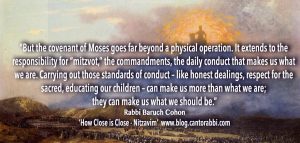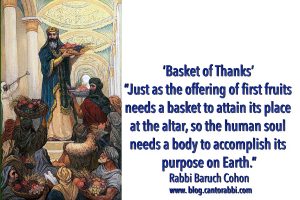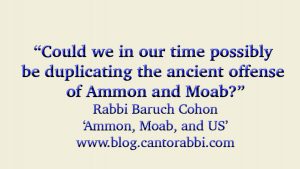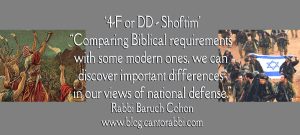HOW CLOSE IS CLOSE? By Rabbi Baruch Cohon – Nitzavim – Deut. 29:9–30
The people are camped on the east bank of the Jordan, listening to a final message from Moshe Rabbeinu —. Moses our Rav. He knows he will not cross that river with them, and he wants them to know what to do when they enter the Promised Land. The name of this reading is “Nitzavim” – literally “Standing.” Not just “standing around,” however. That would be om’dim. The very word Nitzavim indicates they were standing at attention. The opening lines of Moses’ discourse set the scene:
“You are standing today, all of you, before your G-d. Your leaders, your tribes, your elders and your officers – all the men of Israel. Your children, your women, the strangers in your midst, your woodcutters and your water-carriers. [You are here] to form a covenant with G-d… all those who are here with us today, and those who are not here with us today.”
Not here? Did anyone not make that list? That was a pretty complete list. Who was not there? All the unborn generations. Including us. The covenant is a sacred commitment that involves us all.
And what was the covenant? Of course we know the Hebrew word for a covenant is “bris.” That’s right. Bris does not mean circumcision, it means covenant. First came the covenant of Abraham which certainly includes circumcision. That is still observed, even though lately some officials in some places consider it politically incorrect. But the covenant of Moses goes far beyond a physical operation. It extends to the responsibility for “mitzvot,” the commandments, the daily conduct that shapes our lives. It’s what we do that makes us what we are. Moses taught us standards for our conduct – like honest dealings, respect for the sacred, educating our children in Torah. Carrying out those standards of conduct can make us more than what we are; they can make us what we should be.
Earlier in his speeches, Moses went into quite a bit of detail about those standards. Here he refers to the rewards we can expect if we live by Torah teachings, and the penalties that go with their violation – 98 of them that we read last week. Then he anticipates the inevitable question, which does not appear in the Torah but resounds in each of our minds, the question we just have to ask: Isn’t this job too hard? Do you really expect me to do all this?
In Chapter 30 that we read this morning, Moses gives his answer: Hamitzva hazot lo nifleyt hee mim’kha v’lo r’khoka hee,which we can paraphrase this way: This commandment is not beyond your ability, nor is it far away. It is not in heaven, so you don’t need to say “who will go up in a space ship and get it for us and bring it down and tell it to us so we may do it?” And it is not overseas, so don’t look for someone to cross the ocean and bring it back to you. No, this matter is very close to you, in your mouth and in your heart, to do it. Kee karov elekha hadavar m’od, b’feekha uvil’vav’kha laasoto.
Karov m’od – very close. Very close, eh? How close is close?
By attending this service and hearing the message of Nitzavim, you already come closer to fulfilling the commandment.
How about those services you missed last year? Those Shabat and festival occasions when you chose to be somewhere else? Did the covenant desert you because you were somewhere else? What commandment did you fulfill somewhere else? Did you help someone who needed help because their car stalled? Did you remind your kids to get advance homework because they will be absent from school on Rosh Hashana? Did you write a letter to the editor of a newspaper that printed a slanderous anti-Israel column?
By the way, if I can change the subject for a minute, we can all hold our own honest opinions pro or con about Israeli government policies, but some 7 million Jews in Israel are our people, and what affects them is bound to affect us. We are, and we remain, “am segulah,” a chosen people. Divinely chosen for a certain lifestyle, and chosen all too often by human enemies as a victim. Once in a while, like Tevye we might wish that the Almighty would choose someone else, but don’t hold your breath. And besides, those 7 million are also Nitzavim today. They stand with us. One people.
Now back to the contract. Reform congregations will read “Nitzavim” again on Yom Kippur morning, as we come face to face with our spiritual day of reckoning. For traditional Jews, this very Shabat sanctifies a week of prayers for forgiveness. We said our midnight prayers at Slichot, we glory in the sound of the Shofar on Rosh Hashana. And ten days later, we will stand at attention, all of us. More Jews in one place at one time than on any other day in the year. Our leaders and our followers, wives and husbands and children, woodcutters and water department meter readers. We stand together – Nitzavim – and we try to honor the covenant.
This is the time, this is the season when we can remind ourselves that our commitment to our Torah, to our faith, to our people, is not beyond our reach. It is not in heaven, but here on earth. It is not exclusively overseas, because our forebears brought it to America. It is indeed close to us.
How close? As close as the mezuzah on your doorpost. As close as the candle on your table. As close as the book on your shelf. As close as your pride in your heritage.
The covenant is as close to us today as the medal a decorated veteran wears. By wearing it, we evidence our pride. It is as close as the cup we lift to celebrate the Sabbath — and by drinking that wine we bring the sweet taste of heritage into our lives. Truly it is in your mouth and in your heart. It is as close as the tree limbs we will lift on top of our Succah, recalling our ancestors’ joy in the harvest. It is as close as the hour we will spend helping a child do some homework. It is as close as the jumper cables we will use to help our neighbor start that stalled car.
Every service we attend, every ritual we observe, brings it closer.
All of these actions are part of our covenant. They are as close to us as we will get to them. The closer we bring our covenant to our lives, the better prepared we can be to face a new year.
Have a great one!






